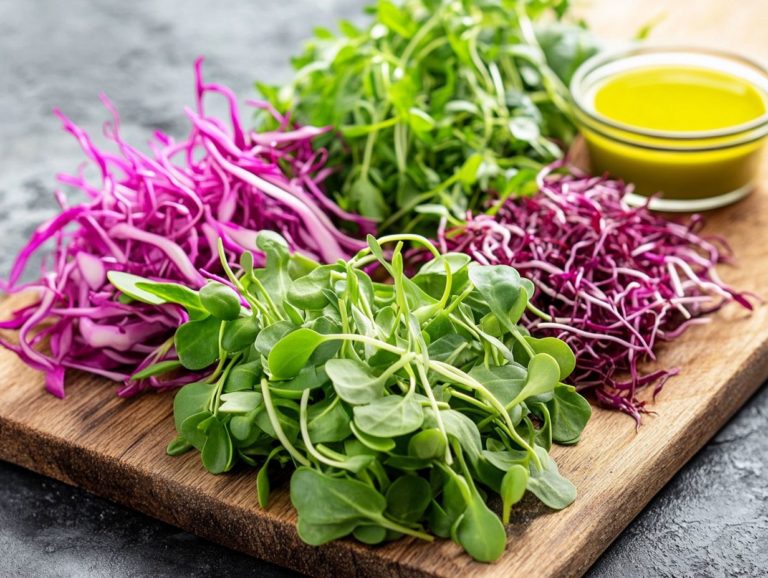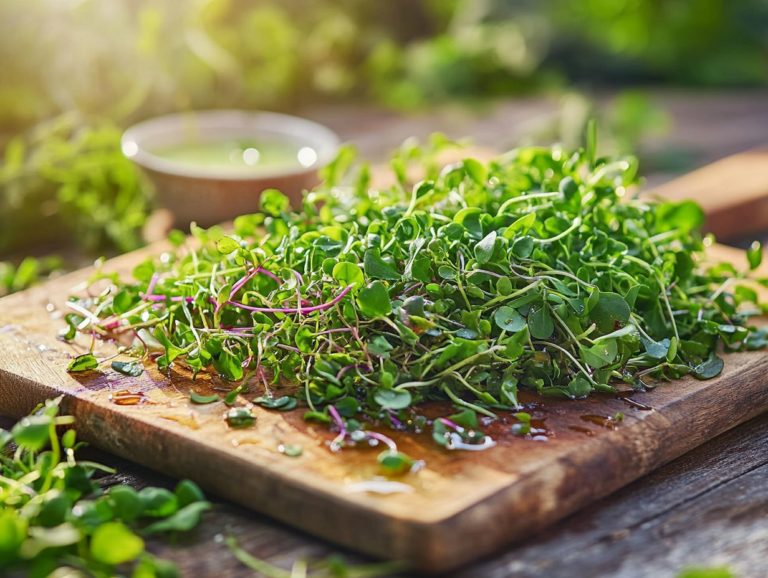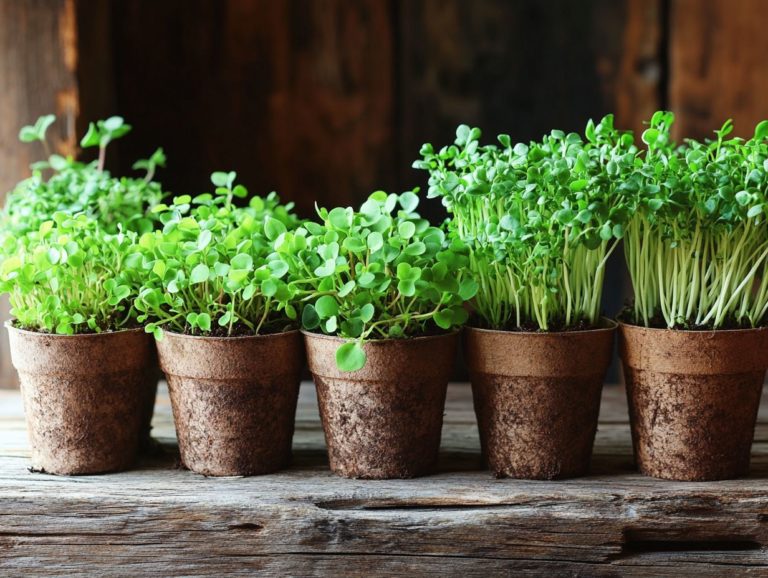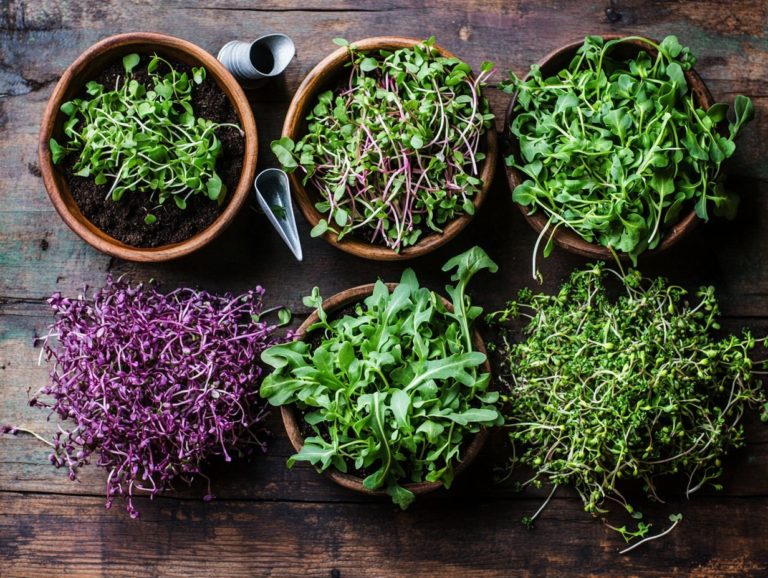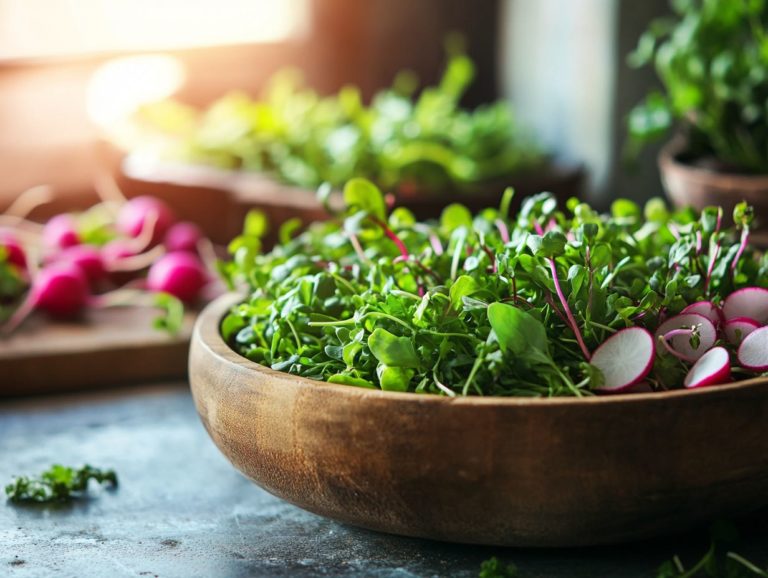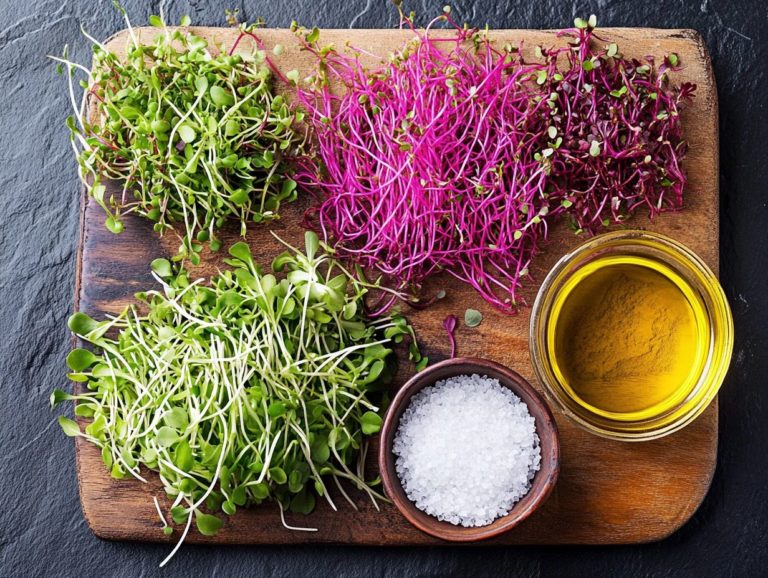The Connection Between Microgreens and Gut Health
Microgreens are vibrant, nutrient-rich seedlings that are capturing attention with their culinary charm and health benefits. They have the potential to combat cancer and support heart health.
Rich in vitamins and antioxidants, these petite greens are important for promoting gut health, essential for overall well-being. This article explores what microgreens are, their nutritional advantages, and how they can enhance gut health, promoting regularity and boosting the immune system.
Learn how these vibrant greens can transform your meals and boost your health! You’ll also find easy ways to incorporate them into your dishes and tips for growing microgreens at home.
Contents
Key Takeaways:
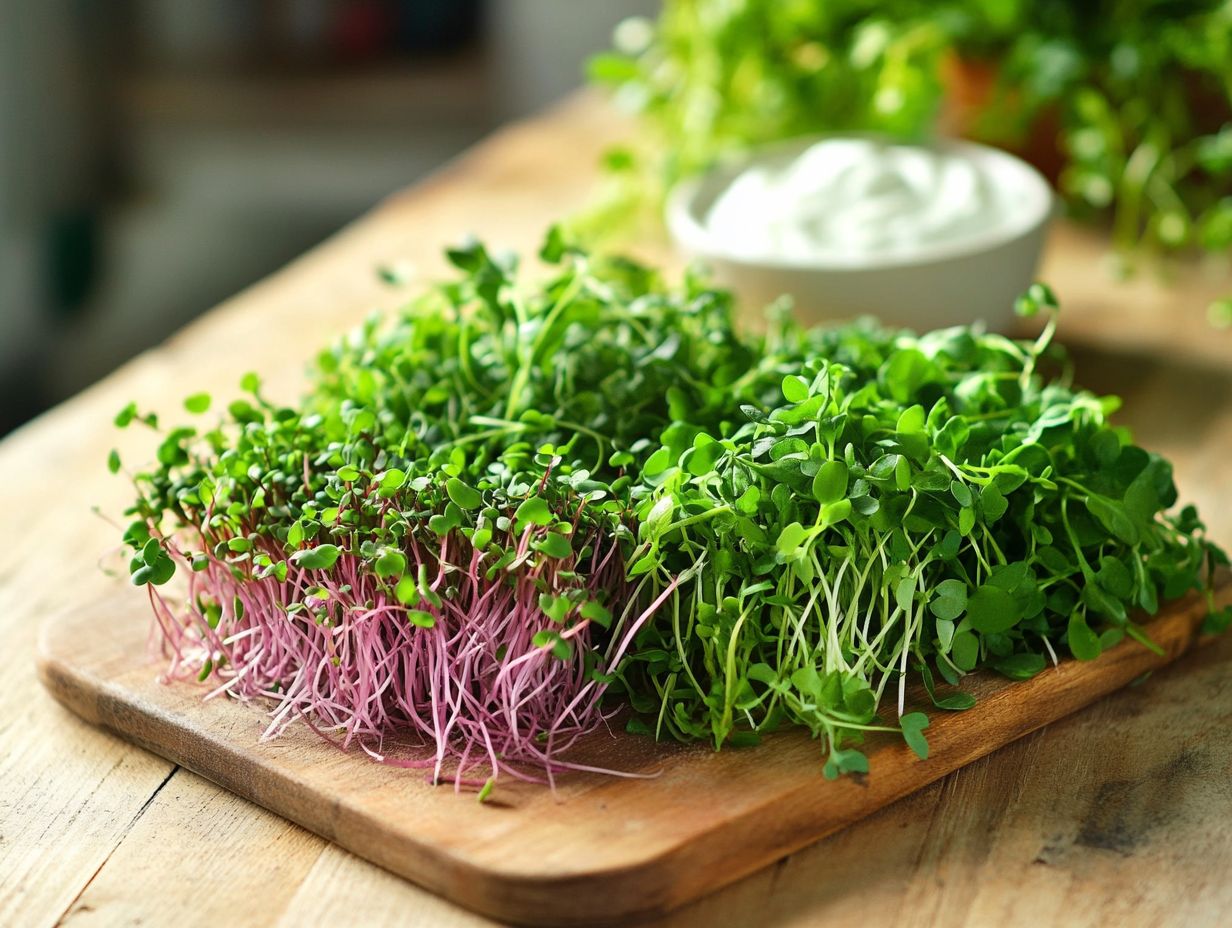
- Microgreens are young plants brimming with health benefits, especially for your gut.
- Including microgreens in your diet provides essential nutrients, promotes healthy digestion, and supports beneficial gut bacteria.
- They can easily be added to salads, sandwiches, smoothies, or used as a garnish on your favorite dishes.
Understanding Microgreens
Understanding microgreens is essential for anyone looking to incorporate these compact plants into a health-conscious lifestyle that prioritizes digestive health. These vegetable seedlings offer a remarkable health benefit, including antioxidants, dietary fiber, vitamin K, and other essential vitamins.
The simplicity of growing them makes microgreens an appealing choice for home gardening, allowing you to cultivate a variety of flavorful greens right in your kitchen.
What are Microgreens?
Microgreens are the youthful wonders of the vegetable world, harvested at their sprout stage, usually between 7 to 21 days after germination.
These tiny greens are not only cute but also packed with nutrients. They often boast higher concentrations of vitamins, minerals, and antioxidants, including omega-3 fatty acids that support heart health. Popular varieties like basil, radish, and broccoli can easily enhance the flavor and presentation of your dishes.
Their delicate textures and vivid colors can transform salads, sandwiches, and soups, elevating both taste and visual appeal.
Unlike fully-grown plants, which require more time and space, microgreens thrive in small pots or trays. This makes them perfect for urban gardening enthusiasts and culinary creatives eager to experiment.
Nutritional Benefits
Microgreens offer a concentrated source of antioxidants, vitamins, and dietary fiber, making them true powerhouses in a healthy diet.
These tiny greens pack a flavorful punch and play a significant role in cholesterol management, contributing to heart health. Varieties like broccoli and kale microgreens are particularly renowned for their natural compounds that may help regulate cholesterol levels.
The immune-boosting qualities of microgreens, especially in red cabbage and mustard greens, enhance your body’s defenses against illness.
With their high fiber content, microgreens promote digestive health, ensuring your gut remains happy, especially when you indulge in spinach, arugula, and other nutrient-dense varieties. By seamlessly integrating these greens into your meals, you can naturally support your overall well-being, as highlighted in the role of microgreens in healthy eating.
Microgreens and Gut Health
Microgreens play a crucial role in enhancing gut health. They provide elements that can significantly benefit your gut microbiome and overall digestive wellness. Their abundant nutrient profile supports a balanced diet, making them an essential component of any effective gut health strategy.
The Role of Microgreens in Gut Health
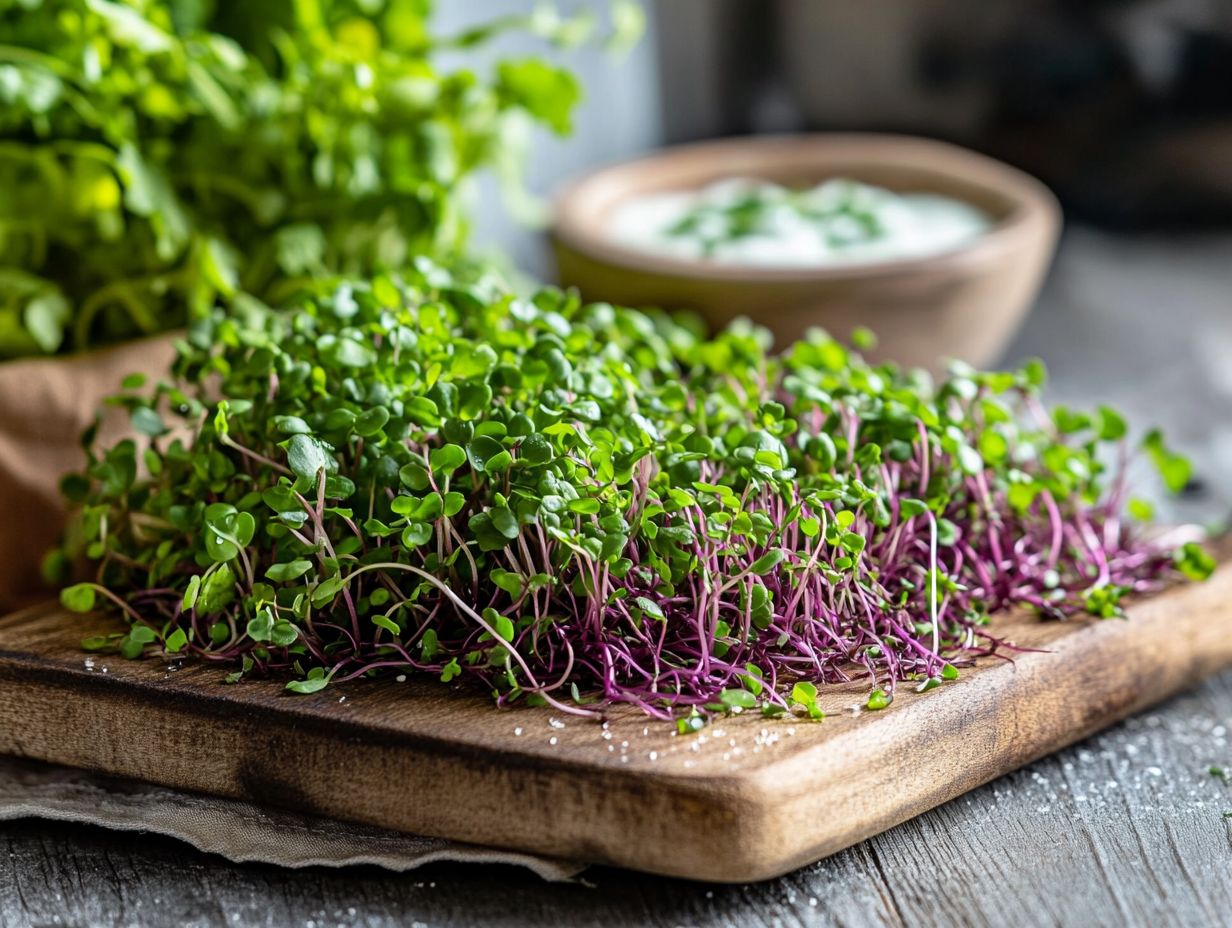
The role of microgreens in gut health is truly remarkable. These small plants are brimming with health-enhancing components that support a well-functioning digestive system.
Rich in dietary fiber, microgreens promote regular bowel movements and help prevent pesky issues like constipation. This makes them an essential addition to your digestive health regimen, and you can explore the health benefits of growing your own microgreens.
These tiny greens also contain plant-based compounds that can benefit health, such as sulforaphane. These compounds have anti-inflammatory properties, nurturing the gut microbiome by fostering beneficial bacteria. By incorporating microgreens into your meals and understanding the science behind microgreens and health, you can cultivate a balanced gut environment.
This balance not only optimizes digestion but also plays a pivotal role in nutrient absorption, ultimately leading to enhanced overall health. With their vibrant flavors and versatility in various dishes, microgreens are essential for a balanced diet and stand out as an excellent choice for anyone seeking to naturally elevate their gut wellness.
Specific Benefits for Gut Health
Microgreens provide remarkable benefits for gut health, helping you manage digestive issues and lower cholesterol levels with their antioxidant-rich composition.
These tiny greens are brimming with an impressive array of vitamins, minerals, and antioxidants, all of which significantly enhance your overall digestive function.
Research indicates that varieties like broccoli and radish microgreens are rich in compounds that help support gut health. They contribute to balancing gut bacteria and promoting healthy digestion, making them essential for a healthy gut. For more insights, check out the health benefits of microgreens explained.
The high levels of vitamins A, C, and E in these microgreens reduce inflammation in the gut, making them an excellent addition to your diet. Their nutrient density not only bolsters digestive health but also aids in lowering LDL cholesterol, highlighting the importance of incorporating these powerhouse greens into your meals for optimal gut resilience. For more insights, explore the impact of microgreens on overall wellbeing.
How to Incorporate Microgreens into Your Diet
Incorporating microgreens into your diet is not only a delightful endeavor but also remarkably simple, elevating both the flavor and nutritional quality of your meals.
With an array of easy recipes at your disposal, these tiny plants bring a vibrant flair to wholesome dishes and seamlessly adapt to various cooking styles. Embrace the versatility of microgreens and transform your culinary experience.
Easy Ways to Add Microgreens to Meals
You ll find countless effortless ways to incorporate microgreens into your meals whether you sprinkle them over salads, blend them into smoothies, or use them as an elegant garnish for your favorite dishes.
These petite greens enhance the visual appeal of your plate and deliver a substantial nutritional boost, making them a fantastic addition to a diverse range of cuisines.
For example, tossing microgreens into your omelets or frittatas can transform a simple breakfast into a gourmet experience, infusing vibrant colors and fresh flavors. Adding them to wraps or sandwiches introduces an exciting layer of texture and a delightful crunch.
They also make a refreshing topping for tacos or grain bowls, harmonizing beautifully with various ingredients. The versatility of microgreens means they can easily blend into nearly any savory or sweet creation you whip up.
Growing Your Own Microgreens
Growing your own microgreens can be a fun and rewarding adventure that brings fresh flavors right to your kitchen.
With the right tips and techniques, you can easily cultivate your own vegetable seedlings, savoring them in their delightful sprout form in just a matter of weeks.
Start adding microgreens to your meals today and experience the benefits for yourself!
Tips and Techniques for Growing Microgreens at Home
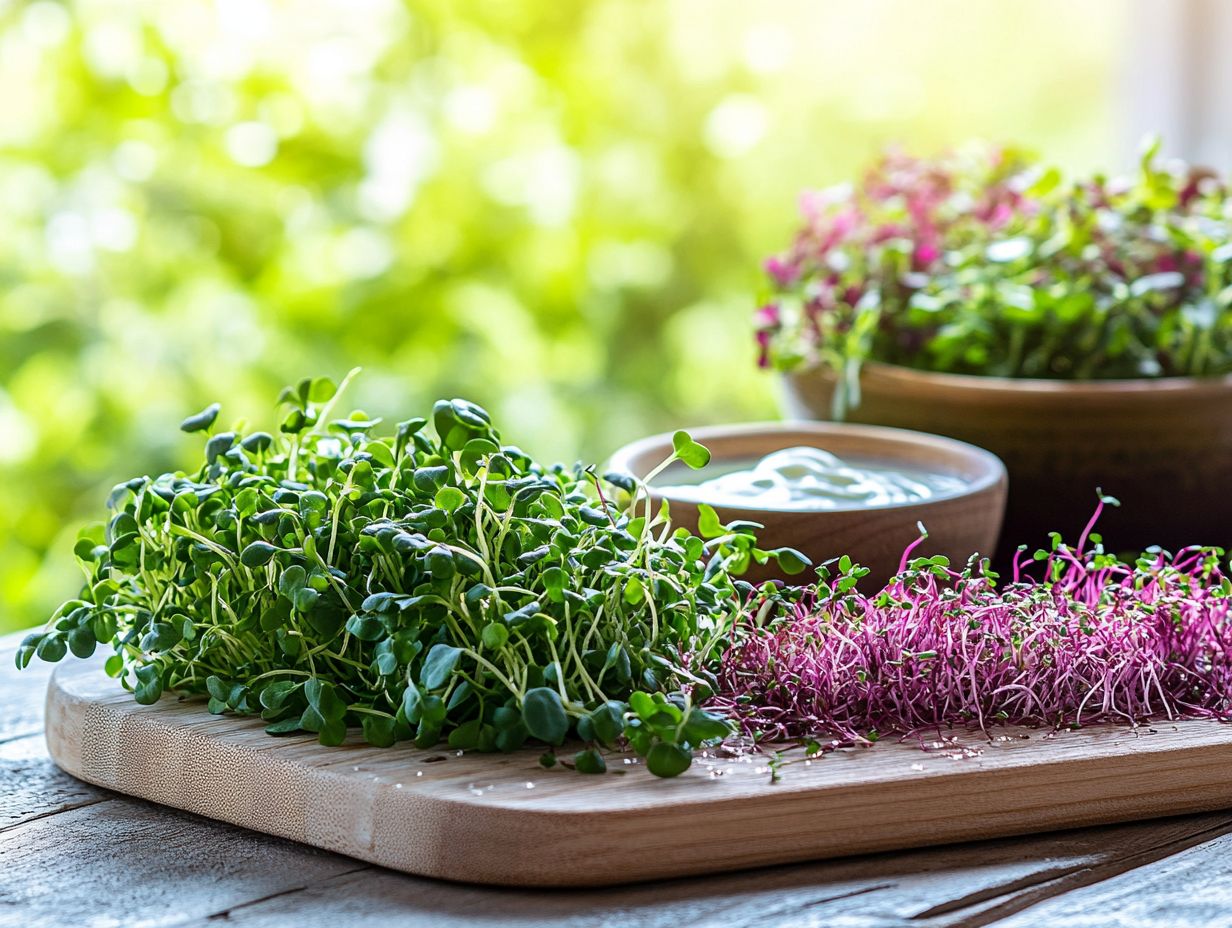
To effectively grow microgreens at home, start by selecting the right seeds, ensuring they receive optimal light exposure, and maintaining proper moisture levels.
By understanding the specific requirements of different plant seeds, you can cultivate a delightful variety of flavors and nutrients to enhance your cooking. It s crucial to source your seeds from reputable suppliers to secure the best seed sprouting rates. Choosing the appropriate growing medium whether soil or hydroponic systems can greatly impact your microgreens health and growth.
Give your microgreens 12 to 16 hours of light each day for vibrant growth! Be mindful of moisture levels. Consistent watering is essential, but avoid waterlogging to nurture strong plants.
Establishing a thoughtful care routine, which includes gentle air circulation and periodic harvesting, will lead to a bountiful and vibrant crop of vegetable seedlings, perfect for elevating your culinary creations.
Other Factors that Impact Gut Health
Consider that your gut health is influenced by more than just your diet; it also encompasses lifestyle habits that can profoundly affect your digestive health and overall well-being. Recognizing these elements is essential for anyone who aims to enhance or maintain a healthy gut, which involves a balanced diet and lifestyle habits.
Diet and Lifestyle Habits to Support Gut Health
Your diet and lifestyle habits are fundamental in nurturing your gut health. A balanced intake of nutrients, including antioxidants and dietary fiber, along with consistent physical activity, are essential elements.
Research consistently underscores the importance of a diverse diet abundant in fiber, featuring whole grains, legumes, fruits, and vegetables that support beneficial gut bacteria. Incorporating fermented foods like yogurt, kefir, and sauerkraut can also introduce probiotics, which are beneficial bacteria that help maintain gut health. Additionally, adding colorful microgreens to your meals can enhance nutrient density and provide various health benefits. Staying well-hydrated by drinking plenty of water not only aids digestion but also facilitates nutrient absorption.
Regular exercise plays a crucial role too, promoting gut motility and alleviating symptoms of bloating and constipation. Managing stress through techniques like mindfulness meditation is important, as is ensuring adequate sleep to significantly benefit your gut health. Additionally, incorporating microgreens into your diet can provide hidden health benefits. Together, these dietary and lifestyle choices are key to maintaining a robust digestive system.
Frequently Asked Questions
What are microgreens?
Microgreens are small, immature plants that are harvested between 7-14 days after germination. They are smaller than baby greens and larger than sprouts, and are often used as a garnish or in salads and other dishes for their nutritional value and flavor.
What is the connection between microgreens and gut health?
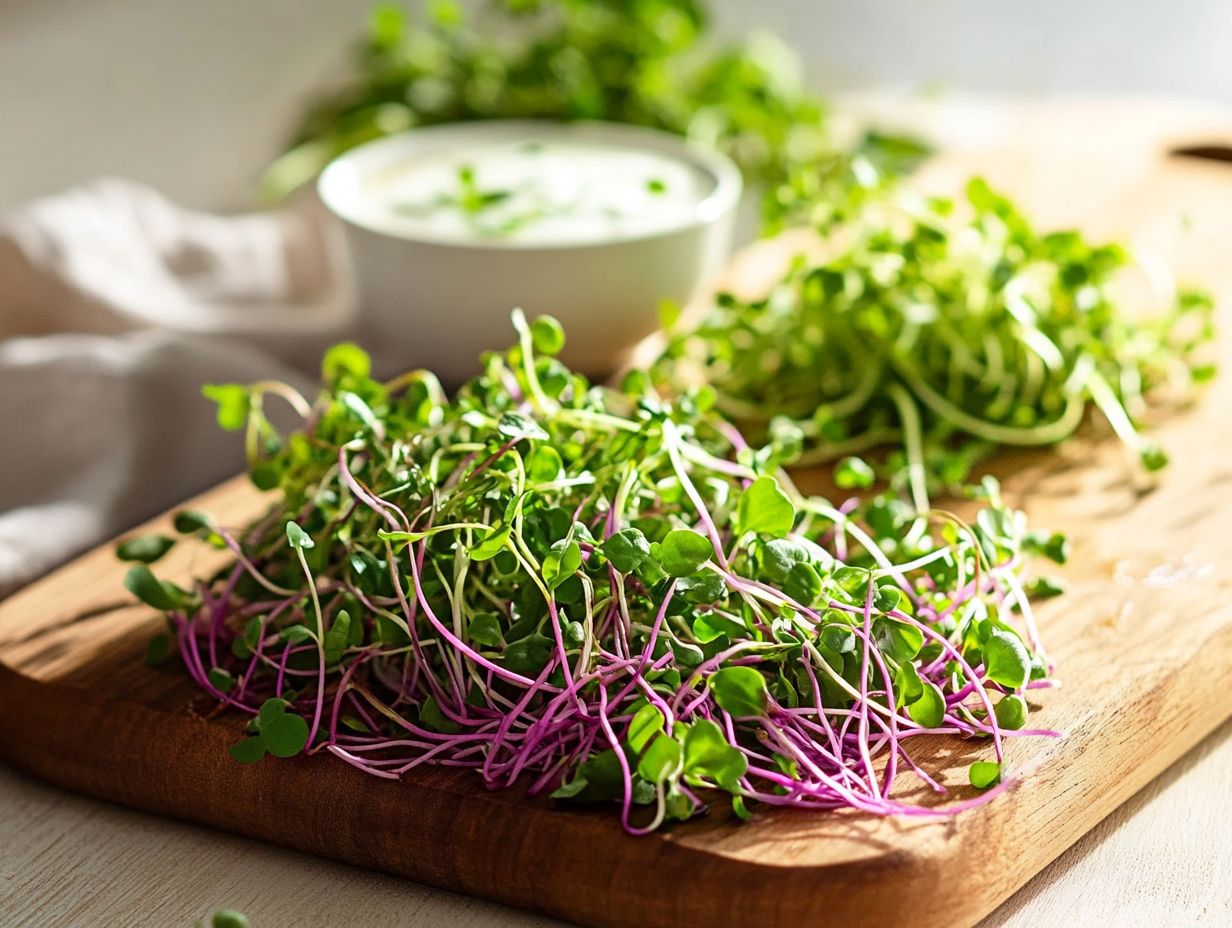
Microgreens are packed with nutrients, including vitamins, minerals, and antioxidants, which can benefit gut health. They also contain high levels of dietary fiber, which is essential for maintaining a healthy digestive system. These tiny plants also offer a nutritional punch for those looking to enhance their healthy diet.
How do microgreens promote gut health?
Microgreens are packed with antioxidants and polyphenols, which help reduce inflammation in the gut. They also provide probiotics, the helpful bacteria that improve gut balance and promote a healthy digestive system.
The rich array of phytochemicals found in microgreens may also reduce the risk of cancer and heart disease.
Are all microgreens beneficial for gut health?
Most microgreens support gut health, but some are particularly beneficial. Broccoli, kale, cabbage, and radish microgreens are high in fiber and essential nutrients that support your gut.
By adding these popular varieties to your diet, you can also help manage blood pressure and cholesterol levels.
How do I incorporate microgreens into my diet for gut health?
You can easily boost your meals with microgreens. Add them to salads, smoothies, or as a topping for sandwiches and wraps.
They also make a great garnish for soups and main dishes. Just a small handful provides a significant nutrient boost for your gut health!
Are there any potential risks or side effects of consuming microgreens?
Microgreens are generally safe and have not been linked to major risks. Always buy from a reputable source and wash them thoroughly to reduce the risk of foodborne illness.

